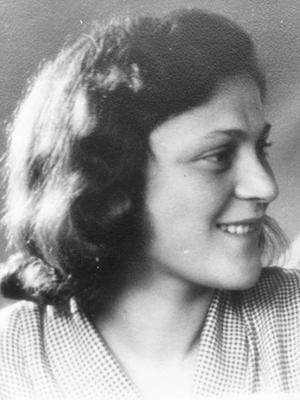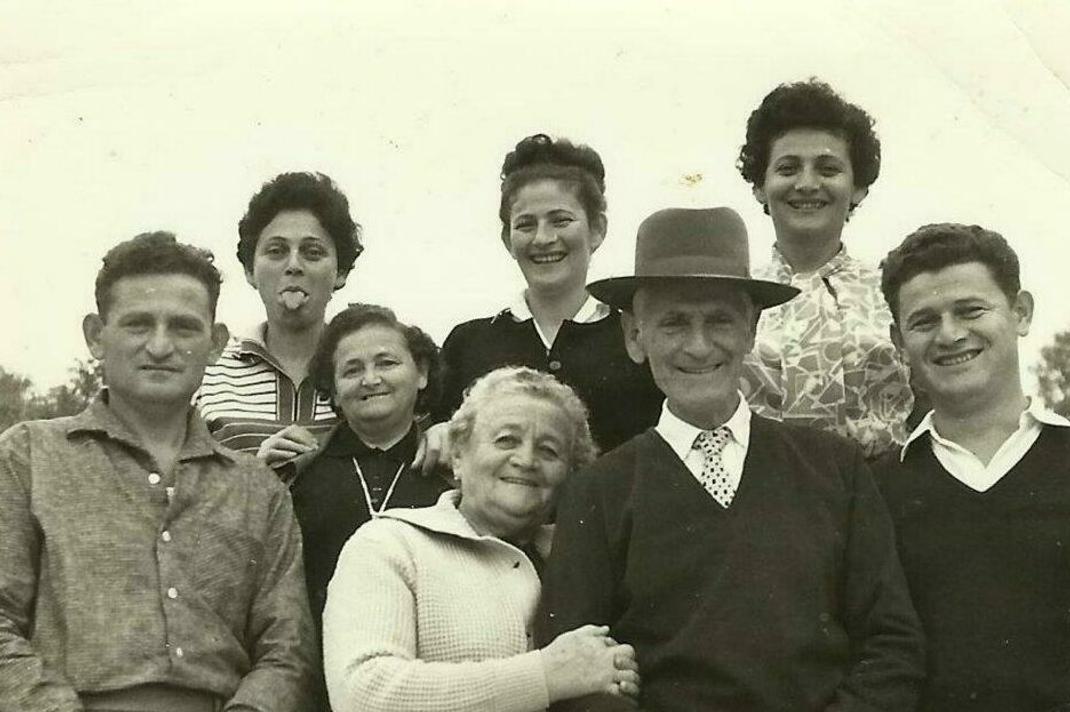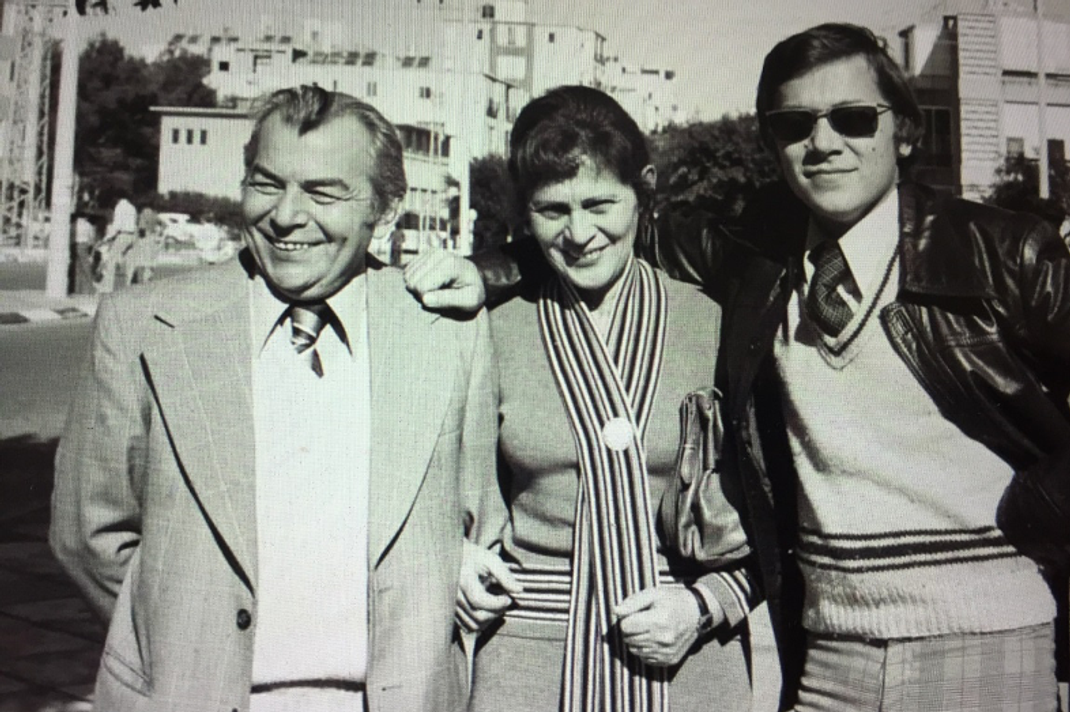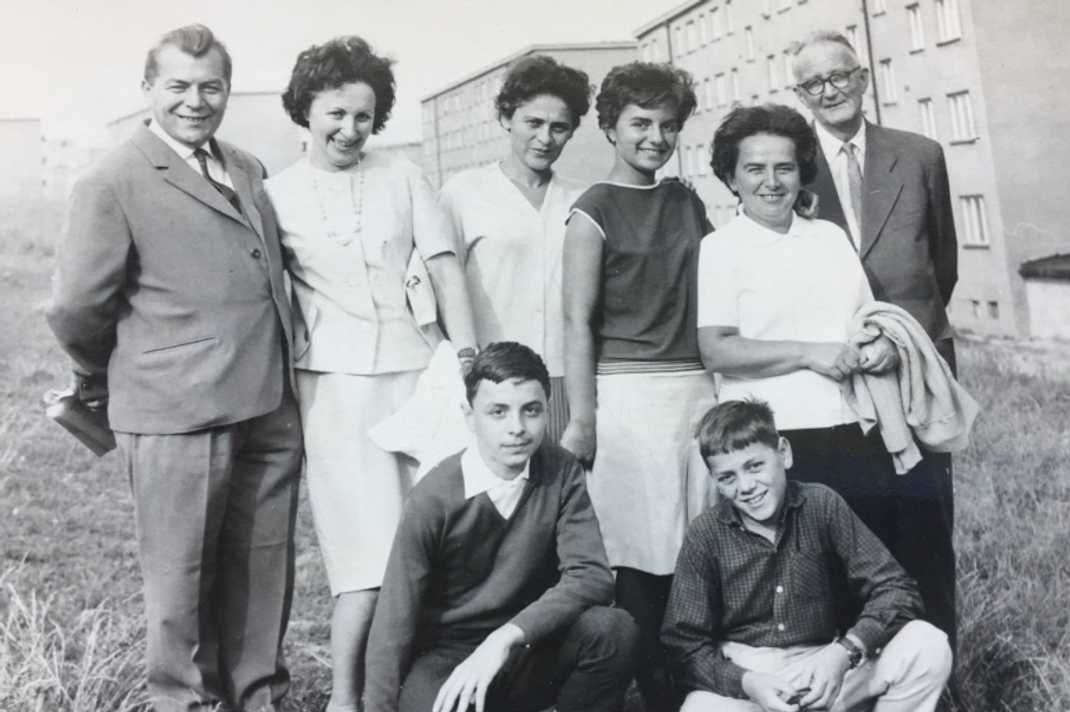Edith Grosman

Born: Humenné, Czechoslovakia (now Slovakia), 1924
Wartime experience: Camps
Writing Partner: Janet Landsberg
Edith Grosman (née Friedman) was born in Humenné, Czechoslovakia (now Slovakia), in 1924. In March 1942, Edith and her sister Lea were on the first official transport of Jews to Auschwitz.
She contracted typhus and tuberculosis while in Auschwitz-Birkenau but survived and remained in the camp until January 18, 1945, when she was sent on a death march to the Ravensbrück concentration camp. Edith volunteered for work to escape the terrible conditions in the camp and was taken to a small camp in Germany for two months. She was liberated by the Soviet army on May 3, 1945. Edith returned to Slovakia and discovered that, except for her sister Lea, her family had survived the war. In 1948, Edith moved to Prague, where she married her husband, Ladislav, and had a child, finished high school, obtained a master’s degree in biology and worked as a technician. In 1966, Edith’s husband, Ladislav Grosman, received the Best Foreign Film Oscar for his movie, The Shop on Main Street, about the “Aryanization” of the Jewish businesses in Slovakia. When Czechoslovakia came under Soviet rule in 1968, Edith and her family left all their belongings behind and escaped to Austria and then Israel. In 1981, Edith moved to Canada to be near her son. She often spoke about her experiences during the Holocaust and was recently featured in the book 999: The Extraordinary Young Women of the First Official Jewish Transport to Auschwitz (2019). Edith passed away in 2020.
The Collaboration of Slovakia
In 1938, the Slovaks got their autonomy. They had their government. The only thing that we still had in common with the Czechs was our money and our military. Although Slovakia was allied with Nazi Germany, its complete independence was announced in March 1939. But we had begun to feel the beginning of the hate in 1938. One Friday evening, the authorities went to Jewish houses, mostly to older people’s homes, and asked if they had citizenship. They wanted to see their citizenship papers. They also went to my grandfather’s house. At that time, nobody travelled. Nobody needed papers. I think that my grandfather had never left Humenné, the town where he was born. My grandfather, of course, didn’t have papers. The authorities collected all the people without papers that Shabbat (the Sabbath) and put them in vans. It was in October, on a very rainy night. We didn’t know about this until the next day. My grandfather was taken away and we didn’t know where to. Nobody knew. Then we heard that he had been taken to the border between Hungary and Slovakia. The group was left there overnight but brought back the next day. This was the first step that the authorities took.
We had been living in a democracy. In the twenty years that the democracy had existed, from 1918 to 1938, nobody imagined that something like this could happen. We heard about what was happening in Germany. But what we heard was so unbelievable that we thought it was not true. Only when the German Jews began to pass through our city, looking for a place to settle, did we begin to believe. We no longer had a quiet life. People went to the shul, synagogue, and all the time you could see Jews grouped together, speaking about politics. All of a sudden, politics was very important.
On March 15, 1939, the Czechoslovak Republic was completely divided. Germany, under Hitler, occupied the Czech lands, Bohemia and Moravia, while Slovakia stayed an independent country — as collaborators with the Germans, but completely independent, with our own money.
In September 1939, the German army went through our town on their way to Poland. Poland was occupied by Germany. I remember being shocked when one of the soldiers saw a little boy with sidelocks, and I heard him say, in German, “So little and he is already Jewish.” He was already sorry for the child. We began to feel a difference when the kids could go to school for only five grades. But by law, they still had to go to school until age fourteen. So, they would stay in school and every year go back to the fifth grade until they were fourteen.
At one point, the Slovaks came and collected all our jewellery. They left only the wedding ring. They took, even from the kids, earrings. It was terrible, but it was the law. What could we do? My father said, “The law is terrible, bad, but it’s a law. We are living in a country, and we have to respect the law.” The Slovaks created completely new laws. They were collaborating with Hitler. Germany didn’t wait too long before influencing the new Slovakia. In the fall of 1941, it was the yellow band. Not a yellow Magen David, Star of David, but a yellow band. With the band, they separated us Jews from the non-Jews.
Then we weren’t allowed to live on the main street. We weren’t allowed to have windows on the main street. The laws kept changing — one thing, then the other. Our family had to move, but I don’t remember moving because they moved immediately after Lea and I had left. I only know that when I came home from the camp, it was to a different home from the one I had left. Then we weren’t allowed to have domestic animals. The dehumanization began. We were afraid to go out. In the winter, we had to put on the coat with the yellow band. In the summer, we had to have it on our dresses.
By this time, we knew that Hitler had a concentration camp in Dachau; that was the first camp, opened in 1933. We had also heard about the Kristallnacht pogrom in 1938. In the countries that were occupied, the non-Jews lived normal lives. But the Jews were another group. They didn’t count. They were nothing. It was hard times for non-Jews in the occupied countries because it was war, but they could live in their own homes until the bombing began. We were alert to what was happening in other places. We heard that there were ghettos in Poland, and we knew it was bad.
The non-Jewish employers weren’t giving any more work to the Jews and it was very tense. People were really afraid to be in the streets. The kids went to school almost with fear. It was not a normal situation. We didn’t know what would happen. Then there were songs against Jews. The antisemites were singing in the streets. The Slovaks had their own military, their own guard, called the Hlinka Guard, part of the Hlinka’s Slovak People’s Party (HSPP). We saw them in the street all the time and never knew what would happen.
Then there was the “Aryanizing” of the Jewish businesses. And they were not big businesses. East Slovakia was very poor. There was no industry there. There were workers, glazers, shoemakers and hairdressers. It became a law that Jews couldn’t own businesses, and it was mostly men from the HSPP that came in as the new bosses of the businesses. But they didn’t know anything about the businesses. Yet, the party members got the jobs and were paid. It was an income for them while the Jewish people became poorer and poorer because they had to give away a part of their income, as did my parents. The new bosses would come once or twice a month to collect the money.
My father’s work for the military was very secret and they didn’t want to train another person, so they kept him on until he finished the work. It was so secret that he would be picked up in a car and his eyes would be blindfolded so he couldn’t see where they were taking him to work. My father got an exemption from deportation from the president, a paper that stated that he was an economically important Jew. The economy needed him because he was working on a project for the military. He was working on hangars for airplanes. My father got this paper, and Lea and I were on it as well; but for us, it came three weeks too late.
March 1942
All of a sudden, they opened the doors and we jumped off the train. We took our packages and went to the gate, which read “Arbeit Macht Frei.” There was nothing much else there: three or four buildings, three storeys tall, and us. We put down our packages and waited to see what would happen. An hour after we arrived, the German prisoners came: 999 German prisoners who were numbered from one to just under one thousand. They were already in prisoner uniforms, and they had their numbers and also the sign of a triangle. By the colour of the triangle, we came to know what they were: the criminals had green triangles, the prostitutes and “asocial” prisoners had black triangles and the political prisoners had red triangles. There were mostly prostitutes and “asocial” prisoners there. Our camp was made up of women only. Later, we saw men who came in to fix this and that, and to collect the dead bodies.
After a few days, another transport came. People began to get sick, and there were no hospitals, no antibiotics.
Then we were counted. Every day, we were counted, which took them four hours. We had to wake up at 4:00 a.m., and at 8:00 a.m. we began to work.
The first image I remember seeing from then was the blood in the snow, from our periods. It was the last time I saw that. I didn’t get my period back until after the war. In Auschwitz, it was good not to have it. There was no hygiene there. On one hand, we felt like we weren’t women but, on the other hand, what would we have done without the possibility of keeping clean, of washing every day?
We were in Auschwitz until June or July 1942. I know it was in the summer when we left Auschwitz for Birkenau. Birkenau is about three kilometres from Auschwitz. In Birkenau, there were Soviet prisoners of war.
***
We had to go to work every day, even in the snow and rain, and we had to have our shoes in our hands when we went through the gate because the clapping sound of the shoes on the ground was irritating to the Germans, the SS who sat by the gate, so we had to keep them in our hands even if we were walking on the snow, on the ice, in the rain. We walked barefoot through the gate, and only when we got beyond the gate could we put our wooden shoes back on.
There was a fence around the camp that was electrified at night. During the day, when people went out to work, the electricity was off. But at night, when it began to get dark, they switched on the electricity and nobody could leave the camp....
We came outside for counting one day and saw a tent in the middle of the place where they counted us, a huge tent. It hadn’t been there the night before. A German man came in — I remember he had the green triangle of a criminal — and he said, “You know what this tent is? There are children’s shoes. And you know where the children are? You see the smoke? Those are the children.” A normal brain doesn’t catch it. We didn’t believe him. We went to work and we were saying that we were not surprised that he spoke like that but for sure it was not true. We didn’t believe it. But it was very strange.
If someone was sick, if they had a small wound on their leg, they were separated, collected, and we didn’t see them anymore. They began to collect people — sick people or people who couldn’t walk or who had wounds. The gas chamber was finished. Then we knew that the kids and the shoes and the smoke — everything was true.
***
Thousands of books could be written on the disaster that was called the Holocaust; this disaster is so big that I think it cannot be fully described. Ever. And I was there; I lived with it, even seventy-five years after I was taken. I lived it. I saw it. I had the diarrhea, the typhus, and I had tuberculosis. Through so many years, there we were — thousands of girls sick and without toothbrushes, and no dentists, our faces swollen, our teeth broken and rotten. You cannot describe how this situation was and how each one of us dealt with it a different way, how each of us was strong enough to hope maybe it would get better, that it was worth the fight, not physically but mentally, and that spiritually, we would survive. You had people who said, it’s not worth it to fight. Why fight? I will die anyway. And to tell you the truth, I did not believe that I would survive. But I said to myself, I will do what I can. I want to see how I will die. Will I die in the gas chambers or before? When will they take me?
One day, Himmler came to our camp. We were standing in rows when he arrived. They were counting us. The morning was still a little dark. It wasn’t complete daytime yet. There was a snowstorm, a really terrible storm. He came in, arrogantly, wearing boots. I heard the SS woman tell him, “In this weather, we cannot send them out, cannot send them to work.” And he stepped forward in his boots and said, “For Jews, there is no weather.” And we left. It was so bad. And there we were, with our bare feet, marching through the gate, with the SS and the dogs that were trained to kill, not only to bite; they were really trained to kill. These were the conditions that we went out to work in — snowstorm, rainstorm, freezing rain, hot, crazy hot, crazy cold. Not dressed, not washed, unkempt (though we didn’t have hair) and with hardly any food, maximum eight hundred calories. In a very short time, we looked like noodles. We probably weighed about sixty-five pounds.
Thousands of books could be written on the disaster that was called the Holocaust; this disaster is so big that I think it cannot be fully described. Ever. And I was there; I lived with it, even seventy-five years after I was taken. I lived it. I saw it.
Winter 1942
In the winter of 1942, I got typhus. The memory is so alive, so vivid. I feel it when I speak about it. I see myself, and I see Lea pulling me to work, telling me, “Stay straight.” For two weeks, she didn’t have any liquid. She gave me her tea because I couldn’t eat and I gave her my food. I must have had a fever of forty-one degrees and I was going to work and lifting bricks for buildings. And after ten days, I woke up one day and I said, “Lea, I am hungry.” And she, instead of being happy, said, “But I am not hungry.” The procedure now went the opposite way: She got my drinks and I got her food. But she never came out of it.
I wasn’t so strong after the typhus but I was pulling her to work. Then one day, the guards could see that she couldn’t work. She couldn’t walk. Block twenty-five was for those people who couldn’t go to work. From time to time, they were collecting people from the blocks. Usually, they made a transport to the gas chamber with one thousand people. They caught Lea and took her. The night before the transport, I think it was December 5 — I’m not sure of the date, but I am sure that it was Shabbat Chanukah — I saw her, desperate, almost in a coma. Every time the Germans made big transports, it was on a Jewish holiday. That evening, I saw Lea on the lowest part of the bed, alone. As I was speaking to her, guilt fell over me. She was able to save me and I was not able to save her. I didn’t know that it was the night that they were taking them out. So, I lost her. It’s a known saying — “the guilt of the survivors” — and I feel guilty even now. And my father felt guilty. He said, “My duty was to take care of my kids. I was the father and I wasn’t strong enough to take care of all of you.” I was standing there and looking at her and I felt I had to be there instead of her. I was the younger one. I was the weaker one. And yet, I am here.



Epilogue
I think that I am alive because of my character and will. People my age are hardly walking and today I went on six escalators. I know people who are eighty who would not go on an escalator. My rabbi says that she learned from me “life joy,” not the joy in life but “life joy” — to live with a feeling that you got a present that is the biggest that exists, and it’s life. My husband taught me how to age. If you know how to age, you can have a lot of joy in every part of your life.
By nature, I am optimistic. I love to sing. I used to sing with Ladislav all the time. We were happy that we found each other. My family, they treat me like I am sixty years old. I live by one sentence from a woman who was reading my palm. She said, “You will live to ninety-four.” I decided that since I am ninety-three, I will make sure everything is in order. I am not afraid. I only hope that I will not suffer and my family will not have to look at me lying in a coma or a stroke. I am only sorry that my family will cry.
My grandkids lived in my home every year during summer vacation, for three months. I went to the doctor and dentist with them, and I went swimming with them. We went to McDonald’s every Saturday. I know that they really love me. I know that it will be an even bigger shock for the grandchildren than my son. He loves me, I know, but we are physically a little too far but with the girls, I see them every week. It will be very hard and for the little one, my great-grandson, it will be a big shock.
I don’t think that God punished me but I think that a lot of people would think that they couldn’t go through what I went through. It wasn’t only the camp. It was the hospitals. I was pregnant four times and I have only one child. I had a rash for four years and had cortisone every day. Everything…and to find a life partner, it was everything. He was me and I am he and all of a sudden to lose it. I think of it like this — I had thirty-three years with him, the nicest it could be. The twelve years in Israel, we had a social life that was completely special. Thirty-three beautiful years. Two beautiful grandchildren and a son that I love like crazy. I can say that I am in relatively good health and am completely independent, and I have a head that is still working and remembering things. For my age, I cannot have complaints.

